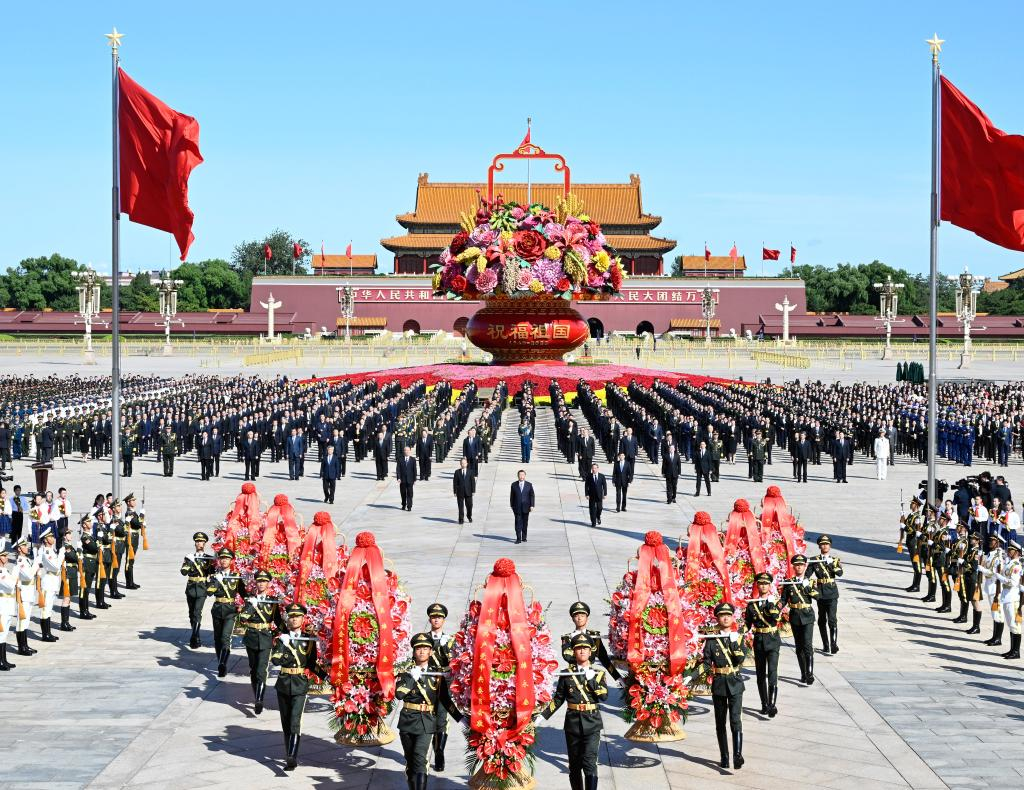Understanding China's past and future on Martyrs' Day: Global Times editorial

September 30 of this year marks the 10th Martyrs' Day in China. On the morning of that very day, in Tian'anmen Square in downtown Beijing, President Xi Jinping and other leaders of the Communist Party of China (CPC) and the state presented flower baskets to fallen national heroes. Since 2014, when the Standing Committee of the National People's Congress designated September 30 as Martyrs' Day in the form of law, President Xi has participated in the wreath-laying ceremony to honor the heroes of the people each year. Just one day before the National Day on October 1, it holds profound historical and practical significance that the country commemorates the heroes and remembers history in the highest form, outlining the great journey of the Chinese nation's rejuvenation.
The People's Republic of China has been established for 74 years. The tremendous changes having taken place in China's national status, comprehensive strength, and people's living standards have made the glorious history of the revolutionaries who sacrificed their lives and shed their blood for national independence, freedom, and happiness seem somewhat "distant." For some young people, it may even feel somewhat "unfamiliar." "Forgetting history is tantamount to betrayal." The heroes revered by a nation best illustrate this point. Martyrs' Day is a kind of inheritance, passing down the heroic spirit and strength of the Chinese people, ensuring that the heroes and their deeds will not fade away with the passage of time, and inspiring the Chinese people to continue their struggle from generation to generation on the journey of the great rejuvenation of the Chinese nation. This is also the true essence of not forgetting the original intention.
"Any nation with hope cannot be without heroes, and any country with promising prospects cannot be without pioneers." The great achievements that China has made up to date were created by the Chinese people and the heroes of the people, who have contributed their sweat, blood, and even their lives. Every era has seen its own heroes, and although the heroes bear the imprints of different times, their spirit of selflessness and sacrifice for the country, for the nation, and for the people is consistent. The contributions they have made are evident to all. The masses of people can often be discerned at a glance whether someone is an authentic hero. As the saying goes, "By reviewing the heroic deeds of the past and present, we draw inspiration from our predecessors to fuel our own fire," and the spirit represented by the heroes and martyrs has long been integrated into the spiritual world of generations of Chinese sons and daughters, becoming an indelible cultural imprint on the Chinese nation. Heroes of every era should receive the utmost and permanent respect in China, which should form an inviolable social righteousness.
To commemorate our predecessors is to inspire future generations. Although the eras of our predecessors have passed, their spirit is still worthy of our promotion. China is currently in a new stage and position, and the great cause that countless martyrs had fought for is facing new challenges, but at the same time also ushered in more opportunities. The internal and external environment for inheriting the red genes has undergone tremendous changes, which requires us to draw strength and direction from the predecessors and heroes of past generations, to never forget our original intentions, and to forge ahead. Chinese society has indeed entered a more diverse state, which is a reflection of the country's progress. However, the main theme of Chinese society must be filled with a heroic spirit. The main theme and diversity are not contradictory or conflicting, but complementary. The spiritual core of the Chinese people must never change, and we must resolutely fight against historical nihilism and remain vigilant, cautious, and resistant to the ideological infiltration of the West into China. To destroy a nation, one must first erase its history. The historical lessons in this regard are profound.
One more point must be mentioned: The ultimate goal of all the struggles and efforts of the Chinese people to commemorate the martyrs and heroes is to create better conditions for the peace and development of the country and the nation. Just like the War to Resist US Aggression and Aid Korea (1950-53), which was fought to defend the our homeland and strive for a peaceful environment for national construction, it is essentially a pursuit of peace. This point is particularly important in the current context. With the accelerated evolution of the global situation over the past century, people remember history and pay tribute to the martyrs in order to better understand the value of cherishing peace while also remembering the principles defended by the heroes and martyrs. In other words, what we need is not only to cherish the hard-won peace but also to firmly uphold justice, as these two are dialectically unified. The inherent logic and historical inevitability of China's firm commitment to the path of peaceful development also lie in this balance.